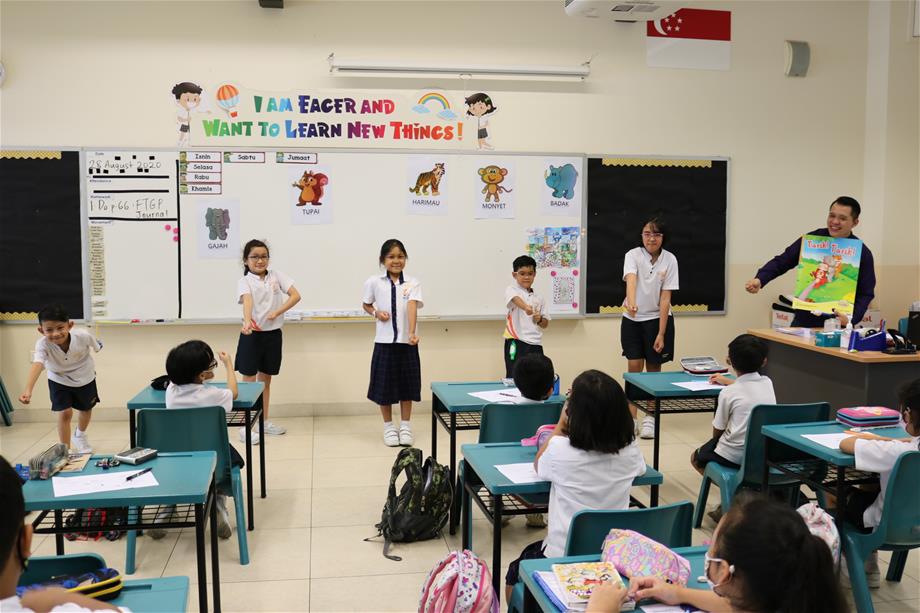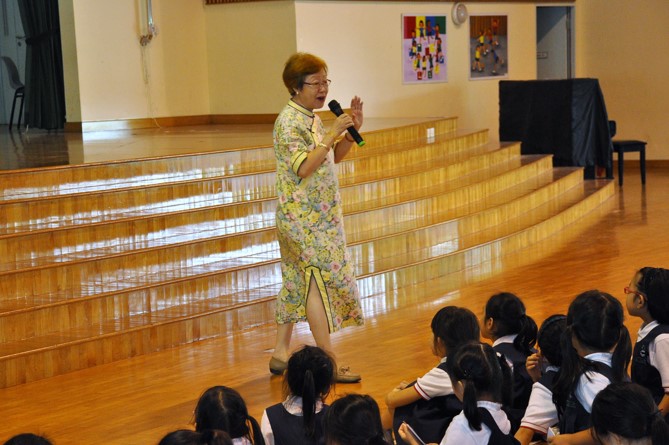For a teacher whose first career was as a paramedic with SCDF for five years, Mr Azhar Bin Abdul Rashid, certainly knows how it feels to come close to fire. One of his favourite Malay proverbs he teaches in class is Genggam bara api, biar sampai jadi arang (Hold the coals of fire, let it turn into charcoal), which translates to mean that one has to do any difficult job with diligence in order to achieve success.
Mr Azhar has been a Malay language teacher for 10 years. Previously, he taught at East Coast Primary School; now he’s at Springdale Primary School, where he is currently Head of Department of Student Management. One of his roles is managing students’ behavioural issues and learning needs through the use of effective teaching strategies.
Supporting struggling readers
“Students struggling to read is an issue I want to address,” he says. “Their difficulty is painfully obvious when they try to read aloud. Sometimes they will remain silent when asked to read, or they stop and start frequently, mispronouncing some words or skipping others entirely. They start to grow ashamed as they struggle with a skill their classmates could master easily.
“Later on, when they switch from learning to read to reading to learn, they may feel left out which, in turn, affects their self-esteem.”
As a language teacher, Mr Azhar tries to inculcate values in his students, through proverbs such as Alah bisa kerana biasa (It can be because it is normal) which translates to mean that even if something is difficult, if it is done constantly, it will become normal and easy. To put this value into practice, Mr Azhar introduced Readers’ Theatre in his classes.
 Students taking part in Mr Azhar’s Readers’ Theatre class.
Students taking part in Mr Azhar’s Readers’ Theatre class.
Boosting self-esteem through Readers’ Theatre
“The goal is to boost students’ reading skills and confidence by having them practice reading aloud with a purpose,” he says, “as Readers’ Theatre combines reading practice and performing.
“With repeated readings, the students recognise words and build a strong sight word base that aids their oral reading and increases their reading fluency rate. This makes reading less laborious and more enjoyable. Students become more engaged, confident and motivated to read.”
In Mr Azhar’s classes, his students are differentiated into mixed-ability groups so those who are able to read can coach beginning or emergent readers. “Before the start of the group activity,” he says, “I will model the reading using the right pronunciation, intonation and expression. This helps students to be more aware of the expectations. After the students have practised, they will perform in front of the class. This lets them showcase their reading ability and allows me to assess their reading progress.”
Motivating language learning through games
One other reason Mr Azhar uses Readers’ Theatre is because students, especially those in the lower primary, prefer activities which are not desk bound so that they can move around. Another teaching strategy is game-based activities, which he applies to students from all levels.
“Games-based activities teach students to collaborate, communicate, interact and work in teams. In all games, there are winners and losers. It’s important to teach students about not giving up, even when they might lose; they also learn about taking turns, abiding by game rules and to reflect on game strategies.”
This includes students having to watch meta-cognitive games in groups via videos on iPads. Later, they answer questions based on what they have seen, tied in with topics about values, by cooperating with each other in the group.
Incorporating values within questions
“The questions themselves can also incorporate values,” he explains, “such as ‘What kind of values did you notice in the video?’ Sometimes questions relate to units taught in the textbooks, for instance the Dos and Don’ts during house visits, removing one’s shoes, showing respect by not touching people’s things in their houses or entering other people’s rooms.”
This brings to mind another proverb that Mr Azhar teaches often: Yang elok itu budi, yang indah itu Bahasa (The good is grace, the beautiful is language), which means living with good manners will ensure that we will be respected by others. To enable his students to remember values such as this, he encourages his students to use graphic organisers such as mind maps.
“When the topic discussion is on an abstract idea like values, it can be difficult for students to arrange ideas in their head clearly. I encourage the use of a graphic organiser to help them organise, clarify and simplify complex information. This tool can be used for comprehension, composition, Show-And-Tell oral presentation or when having conversations based on a video stimulus, which many of my students find it easier then to arrange their ideas and express them sequentially.”
 A graphic organiser used in Mr Azhar’s class.
A graphic organiser used in Mr Azhar’s class.
Always learning and evolving
Learning to persevere through failure is one of life’s values Mr Azhar holds to heart. A few months before he sat for his O-Level exams, his Form Teacher shared with him a quote which he has tried to live by since: the road to success is always under construction.
“I wasn’t sure if I could pass that important exam, as I was either failing or barely passing for many of my subjects. But my teacher didn’t give up on me – she encouraged and coached me. Eventually, I made it to polytechnic and then to university, thanks to a teacher who believed in me.
“Since then, whenever I came face to face with failures, I reflected and asked myself what I did wrong and what I could do to make it better. As a teacher today, I impart the same value to my fellow colleagues and students, hopefully to inspire them as much as it had inspired me.”
*For more information about Mother Tongue Languages, visit the e-MTL Symposium 2020 at www.mtls.edu.sg






